This story began in those ancient times when the sun was shining brighter and the grass was greener.
Samsung has unveiled the Galaxy S3, nicknamed 'plastic remnant' by users. The company Apple has increased the diagonal of its smartphone to four inches, which has horrified many conservative fans. HTC released the first smartphones of the HTC One line, which became the beginning of the end for the company. The Japanese Sony bought out Ericsson's stake and began producing smartphones under its own brand. Within the framework of the Google I / O conference Android 4.1 Jelly Bean and the 'smart' voice assistant Google Now (aka Google Search, aka Google Assistant) were presented.
It was 2012.
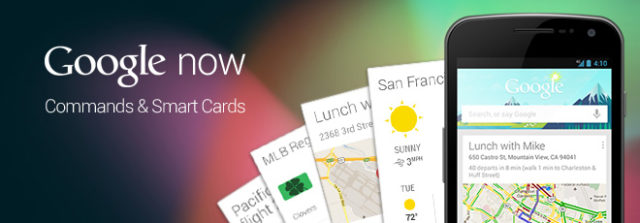
An assistant on the horizon
At the time of the announcement, Google Now was practically unable to do anything and supported only a modest dozen of cards-tips. But the audience still received it very warmly. Journalists painted pictures of a brighter future in which Google Now will become the backbone of wearable electronics and smart home components. Analysts talked about the upcoming market change and the excellent prospects for Google. Users who did not have the opportunity to test the novelty in practice demanded OS updates from the manufacturers and wondered what else Google Now would have time to learn.
Now this may seem strange, because these days such announcements go almost unnoticed and do not cause any excitement. For example, it would never occur to anyone to seriously discuss how Bixby will make life easier for Galaxy S8 owners.
In those days, mobile technology developed at a tremendous speed, users actively followed new products, and other devices became outdated even before they had time to go on sale. Looking at Google Now, which at the time of the announcement was an ugly duckling, many immediately saw in him a beautiful swan. It seemed obvious that the search giant would finish it up in a year or two, and in five or six years the service would be completely unrecognizable. After all, this is an entire era for mobile technology.
Expectations and reality
There was only one mistake in this reasoning. Google's approach to developing new devices and services is very different from the generally accepted one. Basically, large companies show new products to a mass audience only when they are confident in their commercial prospects. And even if later it turns out that the new idea did not succeed in gaining much popularity, the company will still stick to it to the last, trying to turn sour lemons into sweet lemonade. And to get at least some profit on this, even if not too much.
Google, on the other hand, believes that if you already have the Tsar Cannon at your disposal, then it is better to shoot with it at the moon than at sparrows. And it doesn't matter that there are almost no chances to hit, because shooting at sparrows is completely pointless at all. The shot went into 'milk'? It doesn't matter, there will be a better reason to adjust the next one.
 Offtopic: Google X Lab
Offtopic: Google X Lab
Someone uses Google Now, some don't. Someone has it installed only on the phone, and someone even specially bought a special 'smart' watch. But for the most part, both those and others agree that no revolution has happened and the expectations associated with the service have not been met. In any case, for today.
How serious is Google going to improve this service further and what are the prospects for it? Will he be able to become popular in its current form?
At first glance, it might seem that Google Now is developing very actively. Updates are released for the application, 'doodles' pictures appear on the main screen, occasionally new hint cards pop up, and sometimes the interface itself changes slightly. And more recently, the assistant has often begun to take into account from the user how relevant a particular prompt is and whether it needs to be displayed. The company clearly collects statistics on the work of Google Now and, on its basis, makes certain changes to the service. Another question is, how good is this for the users themselves?

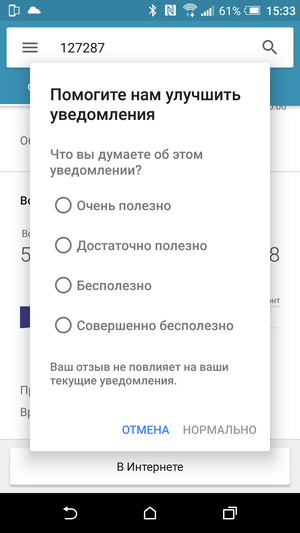
Predictability is an extremely important feature of any program that users use on a daily basis. Any serious instrument anyway. For example, those who type texts in Word every day are unlikely to like it if icons, fonts, menu items in it change arbitrarily every week. And regular readers of the site are unlikely to appreciate the daily redesign, after which each time you have to re-understand which articles are where.
With Google Now, in this regard, everything is very difficult, and even such a banal thing as a weather forecast is displayed in it differently with each update. Either it is a simple search query on Google (sometimes in Russian, sometimes in English), or a full-screen widget with the most detailed hourly forecast, or a short line with only one temperature and a rain icon.
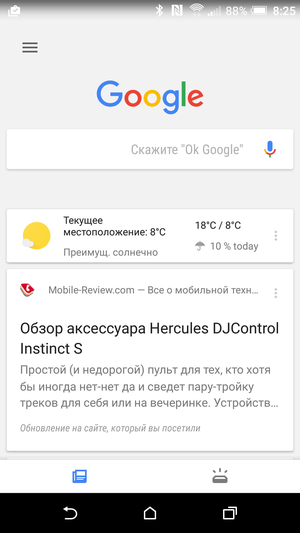
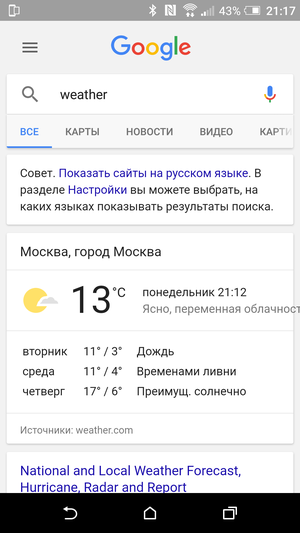
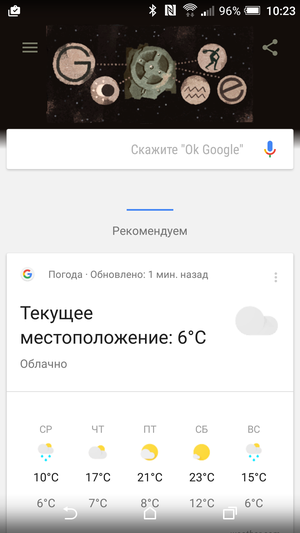
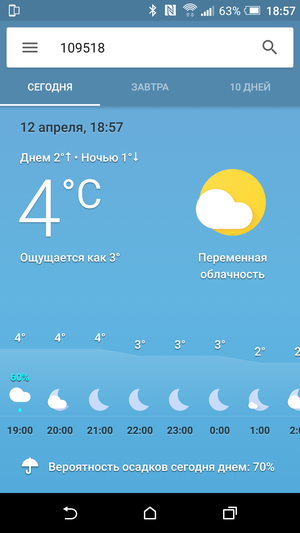
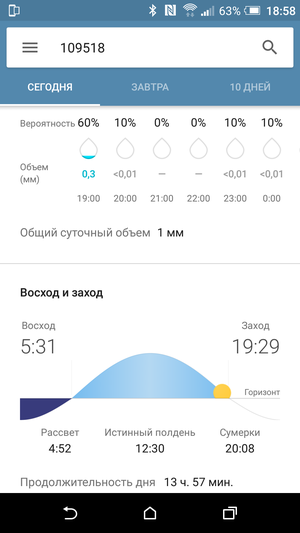

Sometimes it comes to completely ridiculous. With one of the updates, Google Now began to offer to bring the weather forecast icon to the desktop in order to always receive the necessary information in exactly one click. But already with the next update, instead of a special full-screen widget, a standard search engine web page began to appear there with a query for the word 'weather'. Then a few more days passed, and the widget started loading again.


As a result, it is faster and easier not to ask Google Now for the weather, but to download a normal application from Google Play or install a weather widget on your desktop.
The second problem with Google's smart assistant is that it's actually not very smart. And it's not about the number of functions, which just grows over time (for example, tracking discounts on products that you recently searched, etc.). It's about their quality.

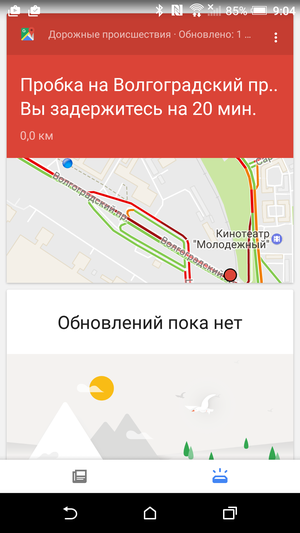
The idea was for the user to always get the right information at the right time. In fact, many algorithms for generating prompts are very primitive and practically do not develop. A trivial example – I'm taking a bus from the city center, the road is completely free. But then Google Now urgently decides to inform me that there is a traffic jam ahead, because of which I will lose extra 30 minutes. The fact that the traffic jam on the way to the center does not affect me at all, and indeed has already been left behind, Google Now does not realize. Even if at this moment maps are open on the smartphone screen, where the direction of movement is clearly visible.
Another example is location problems. For example, when traveling on the subway. If you make a special effort, sometimes you can catch the moment when your smartphone decides that you are somewhere on a neighboring continent. In real life, this is almost impossible to notice, because no one in their right mind would try to launch navigation underground. But Google Now sometimes manages to react to the change in coordinates and begins to happily advise me to exchange offices and 'local' hotels on the other side of the world. The thought that in five minutes I would not have been able to move there in any way does not bother the 'smart' assistant. Google Maps does not display such 'flights' in its horology of movements, realizing that this is just a 'glitch'. But nobody bothered to teach Google Now this.
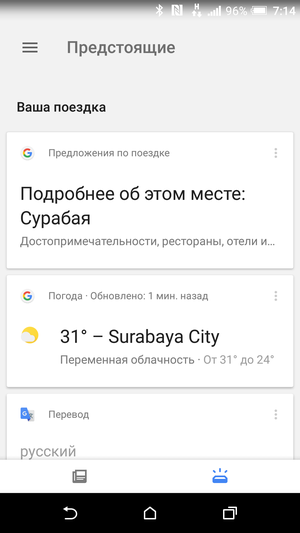
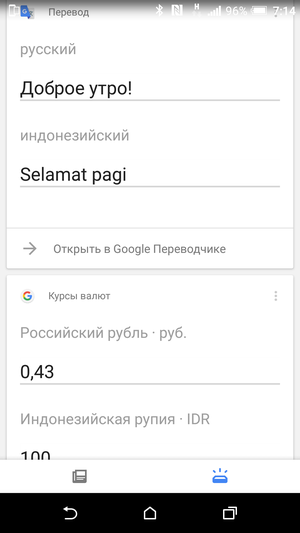
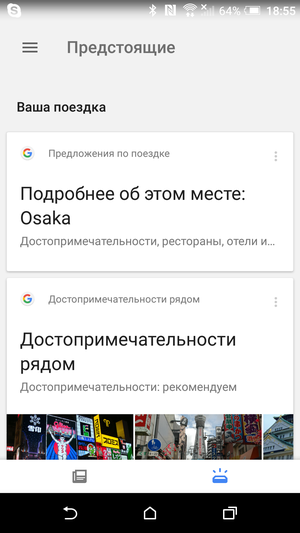
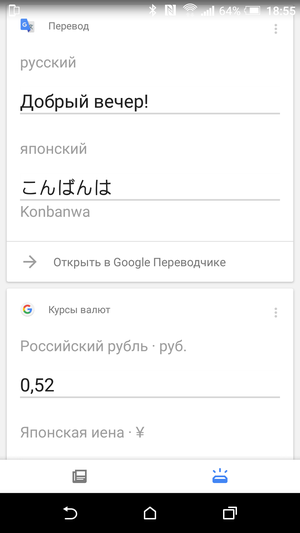
There is no progress in the recognition of voice commands and dialogue with the user. The assistant knows a limited number of spoken phrases that must be pronounced word for word. The minimum step aside – and instead of a clear answer, the user is voiced the first link from Google. For example, in the official reference manual there is a command 'Do I need an umbrella today?', Which the assistant gives the current weather forecast. But as soon as you slightly change the query and ask 'Should I take an umbrella tomorrow?', The assistant will read out the forecast four years ago instead of the current forecast. Simply because he found such a combination of words on the 'RK-Press' website. And it's good if the user notices the catch in time.

I don’t think it’s that difficult to teach Google Now a dozen options for the same query. Even with support for many languages. It's just that Google hasn't gotten around to it over the years.
Beautiful far away
For the search giant, Google Now is not so much a ready-made product for the end user as a large test site. This is the first and roughest model that hardly anyone will ever grind with a file. Moreover, when work is underway on the next, much more detailed layout.
Recently, they have begun to push him into the shadows. On the one hand, it suggests holding the Home key on the Now on Tap contextual search.
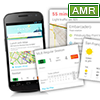 Now on Tap. Why, to whom and for what?
Now on Tap. Why, to whom and for what?
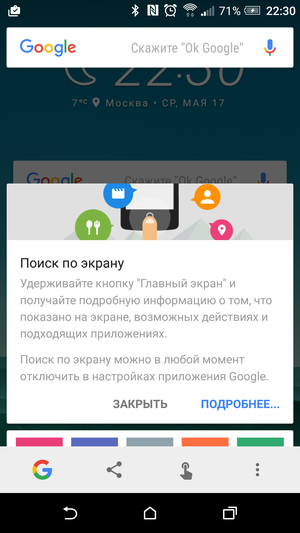

On the other hand, adding Google Now features to profile applications. So, in addition to Google Now, the list of recommended articles can be provided by Google Chrome. A traffic jam alert has appeared in Google Maps, photos of nearby attractions have also migrated there. The assistant himself advises to open the weather forecast using a separate shortcut on the desktop … In fact, the company can abandon Google Now at any time, 'scattering' all (conditionally) popular functions in its other applications.
It will not be superfluous to recall that on May 18, 2016, a new 'smart' assistant was presented at Google I / O – Google Assistant, where many problems of Google Now will clearly be solved. For example, the problem of normal dialogue with the user. And this is not a rebranding or a cosmetic upgrade of the current assistant, but a new project. Which again understood only English and was again available only on a limited number of devices. Another try, another sighting shot at the moon. Probably not quite into 'milk' anymore. But it’s hardly a bull's-eye.
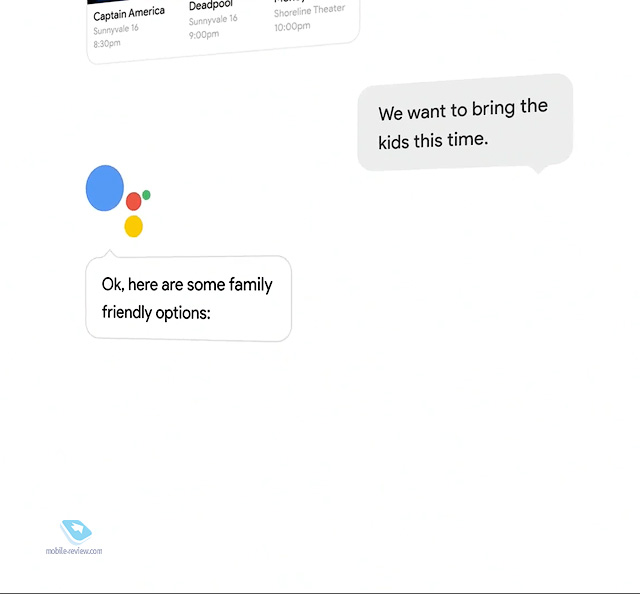
As for Google Now (aka Google Search, aka ex-Google Assistant), Now has done its job, Now can go away. Or just quietly continue to collect statistics and run algorithms on the remaining users, which is even better.
